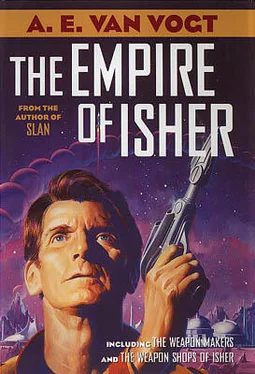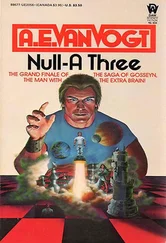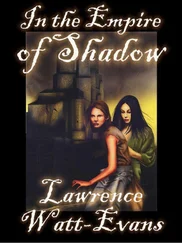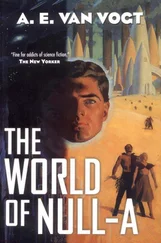He waddled off, still smiling. A moment later, the ball was whirling again.
It was during the third game that Cayle thought out of nothingness: “Why, I’m the center of attention.” It startled him. He had come out of that oblivion on which he had counted to maintain his security. “I’d better slip out of here as quietly as possible,” he thought.
He turned from the table—and a pretty girl threw her arms around him, pressed tightly against him and kissed him.
“Oh, please, let me have some of your luck. Please, please.”
He disentangled himself blankly, the original impulse forgotten. “I was going to do something,” he remembered and laid several bets while he frowned over the elusive memory. He was aware that newcomers were jostling up to the table, sometimes forcibly crowding out the less re sourceful and determined of those who had been there first. Once, when he noticed a particularly violent ejection of a vociferously protesting player, the warning thought ticked again in his head that he and this table were now plainly marked by a thousand avid eyes.
He couldn’t recall just what it was he wanted to do about that. There seemed to be a lot of women around, plucking at him with their fingers, kissing him if he turned his head, and he had a sense of an over-abundance of their perfume.
He couldn’t move his hands without a woman’s bare skin being available for his touch— naked arms, naked backs, and dresses cut so low in front that he was con stantly having his head drawn down into soft, daintily perfumed bosoms. When he bent an inch for a natural reason the ever-present hands pulled him the rest of the way.
And still the night and his luck did not end. He had a sense of too much pleasure, too much applause at every spin, at every win. And whether he won or not women flung themselves into embraces with him and either kissed him commiseratingly or in a frenzy of delight. Wild music played in the background. He was twenty-three years old and the attack on every sense of his body overwhelmed his caution. When he had won uncountable thousands of credits the doors of the Penny Palace closed and the roly-poly man came over and spoke curtly.
“All right,” he said, “that’s enough. The place is cleared of strangers and we can stop this nonsense.”
Cayle stared at him, and the clock of danger was tick ing so loudly that his whole brain hummed with the sound. “I think,” he mumbled, “I’ll go home.”
Somebody slapped his face—hard. “Again,” said the plump man. “He’s still riding an emotional jag.” The second blow was harder. Cayle came out of his haze with a sharp comprehension that he was in deadly peril.
“What’s going on here?” he stammered. His eyes appealed to the people who had been cheering him only minutes before. The people whose presence had lulled him…It was impossible that anything would be done against him while they were around.
He whirled on the plump man. And then stood rigid as rough hands grabbed him and rougher hands probed in the pockets of his clothes relieving him of his winnings. As from a great distance he heard the plump man speak again.
“Don’t be naive. There is nothing unusual about what has happened. All the regular players have been squeezed out. Not only out of the game, but out of the building. The thousand people in here now are hired for such occasions and cost us ten credits each. That’s only ten thousand altogether, and you won from fifty to a hundred times as much as that.” He shrugged. “People don’t realize the economics of such things. Next time, don’t be so greedy.” He smiled an oily smile. “That is, if there is a next time.”
Cayle found his voice. “What are you going to do?”
“You’ll see.” His voice went up. “All right, men, take him to the truckplane and we’ll open up again.”
Cayle felt himself irresistibly hustled across the room and into a dark corridor. He was thinking in despair that, once again, he had put himself into a position where other men decided his fate.
McAllister, reporter from 1951, realized that he was lying on a sidewalk. He climbed to his feet. A group of curious faces gawked at him; and there was no park, no magical city of the future. Instead a bleak row of one-story shops made a dull pattern on either side of the street. A man’s voice floated toward him out of a blur of other sounds: “I’m sure it’s the reporter who went into that weapon shop.”
So he was back in his own time. Perhaps even the same day. As he moved slowly away, the same penetrating voice said, “He looks kind of sick. I wonder what—”
He heard no more. But he thought, “Sick!” These people would never understand how sick. But somewhere on earth must be a scientist who could help him. The record was that he hadn’t exploded.
He was walking rapidly now, and clear of the crowd. Once, he looked back, and saw that the people were dispersing in the aimless fashion of folk who had lost their center of interest. McAllister turned a corner, and forgot them.
“I’ve got to decide.”
The words were loud, close. It took a moment to realize that he had spoken them.
Decide? He hadn’t thought of his position as requiring a decision. Here he was. Find a scientist…If that was a decision, he had already made it. The question was, who? Memory came of his old physics professor at City College. Automatically, he turned into a phone booth and fumbled for a nickel. With a sickening sense of disaster, he remembered that he was dressed in an all-enclosing, transparent suit, and that his money was inside. He drew back, then stopped, shaken. What was happening?
It was night, in a brilliant, glowing city. He was standing on the boulevard of an avenue that stretched jewel-like into remote distance. It was a street that flamed with a soft light gleaming up from its surface—a road of light, like a river flowing under a sun that shone nowhere else, straight and smooth.
He walked along for uncomprehending minutes, fighting a wild hope, but at last the thought forced through to his consciousness: Was this again the age of Isher and the gunmakers? It could be. It looked right, and it meant they had brought him back. After all, they were not evil, and they would save him if they could. For all he knew, weeks had passed in their time.
He began to hurry. Find a weapon shop. A man walked by him, and McAllister turned and called after him. The man paused curiously, and looked back, then continued on his way. McAllister had a brief picture of dark, intense eyes, and a visualization of a person on his way to a marvelous home of the future. It was that that made him suppress his impulse to run after the man.
Afterwards, he realized he should have. It was the last person he saw on all those quiet, deserted streets. It must have been the in-between hour before the false dawn, and no one was abroad. Oddly, it was not the absence of human life that disturbed him. It was the fact that not once did he see a weapon shop.
In spite of that, his hope mounted. Soon it would be morning. Men would come out of these strange, glowing homes. Great scientists of an age of wizard scientists would examine him, not in a frenzy of haste, with the fear of destruction hanging over their heads. But quietly, in the sanity of super-laboratories.
The thought ended. He felt the change.
He was in the center of a blinding snow storm. He staggered from the first mighty, unexpected blow of that untamed wind. Then, bracing himself, he fought for mental and physical calm.
The shining wondrous night city was gone. Gone also the glowing road. Both vanished, transformed into this deadly, wilderness world. He peered through the driving snow. It was daylight, and he could make out the dim shadows of trees that reared up through the white mist of blizzard less than fifty feet away. Instinctively, he pressed toward their shelter and stood finally, out of that blowing, pressing wind. He thought: “One minute in the distant future; the next—where?”
Читать дальше











